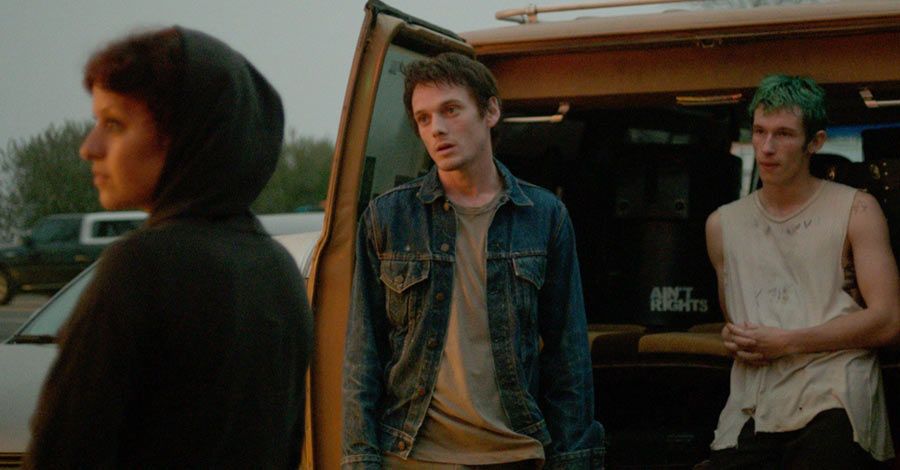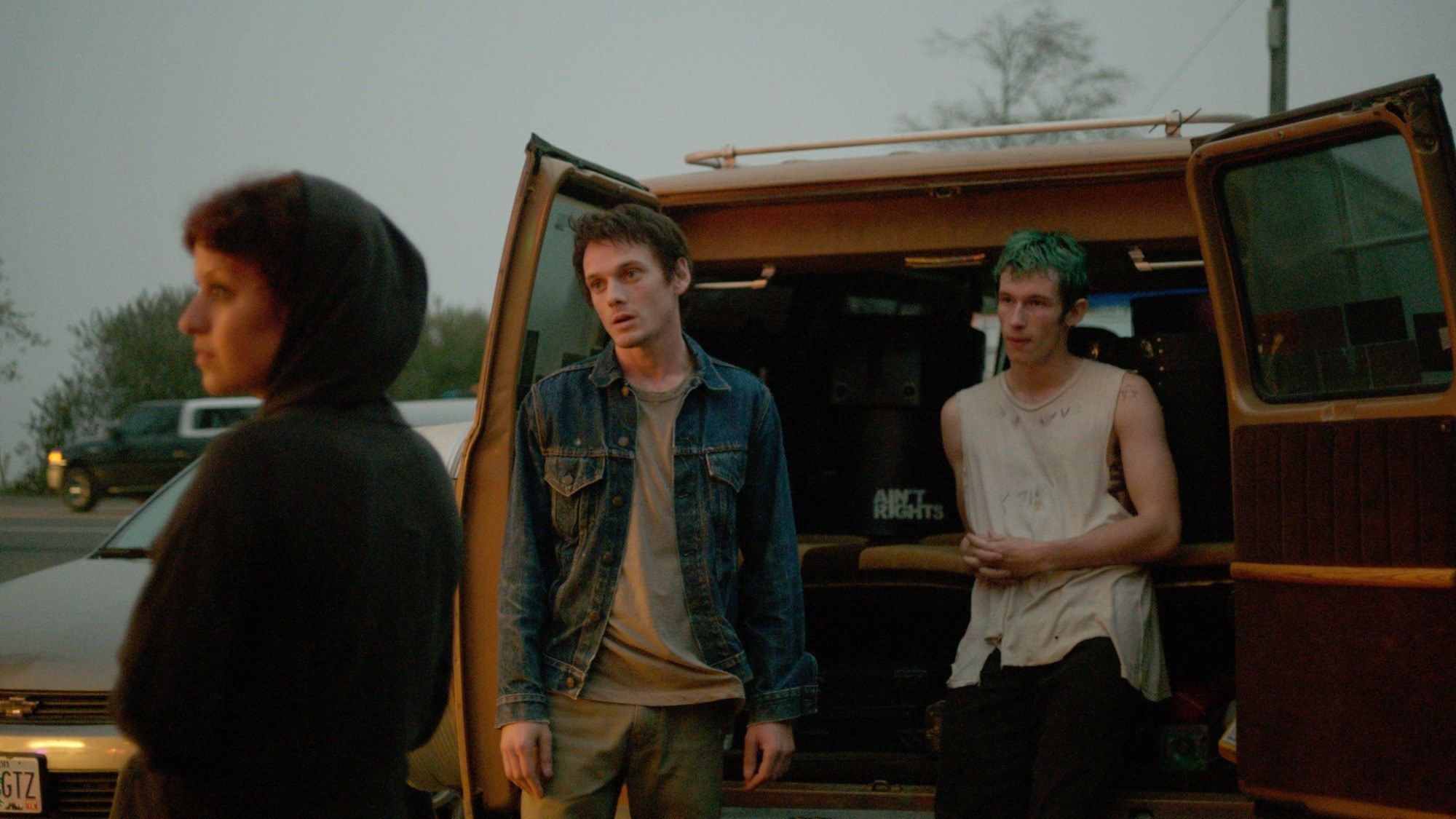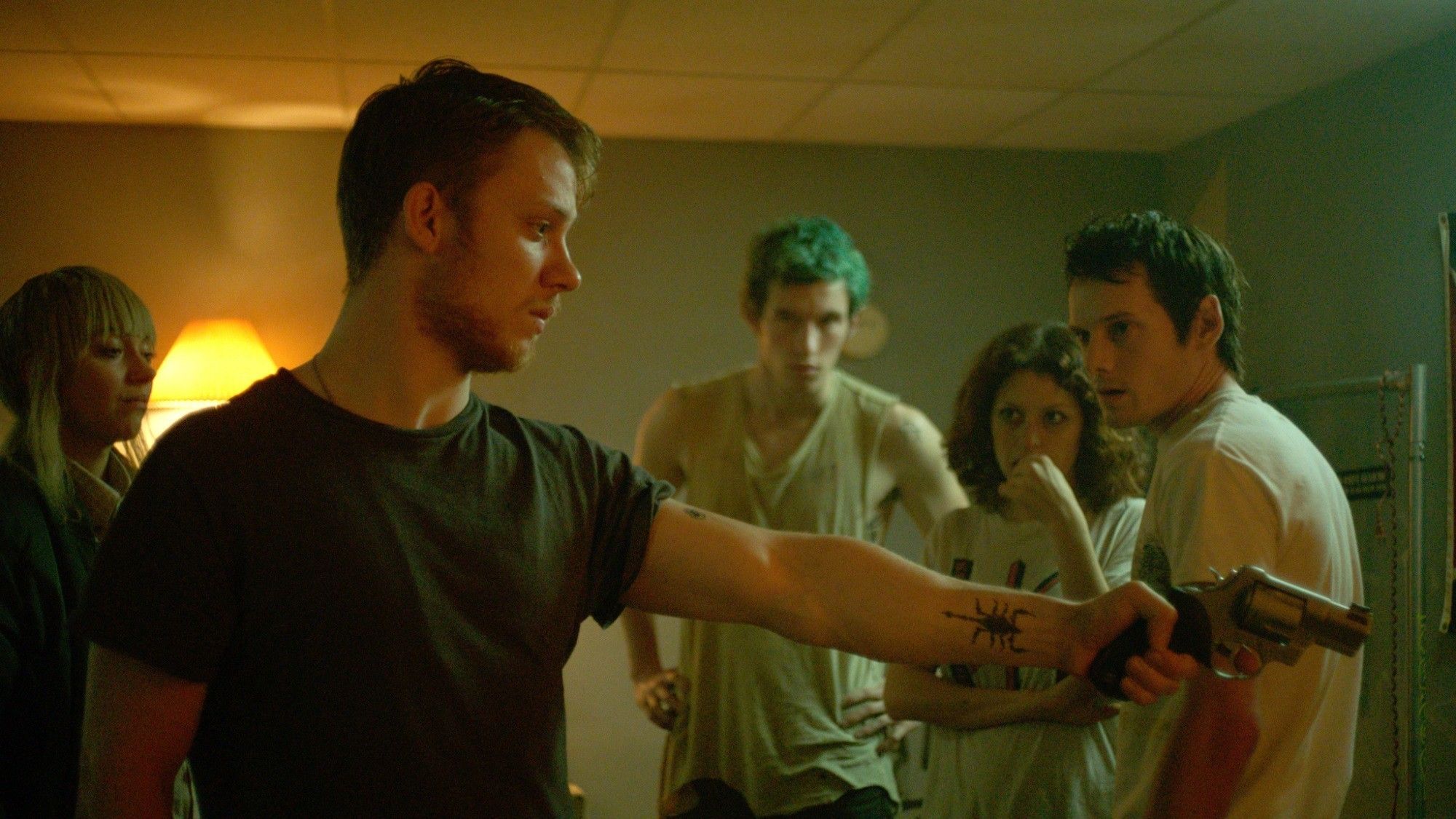"Green Room" isn't your typical thriller. Directed by Jeremy Saulnier, it finds punk band The Ain't Rights, led by guitarist Pat (Anton Yelchin), performing at a skinhead dive in the middle of nowhere. Things spiral out of control after a gig when the group stumbles across a dead body in the green room. The Ain't Rights must struggle to stay alive as Neo-Nazi bar owner Darcy (Patrick Stewart) will do anything to keep the murder under wraps.
Ahead of "Green Room's" release, Yelchin spoke with SPINOFF about the film's pressure-cooker situation, paying respect to the punk rock scene and how the intense shoot contributed to the final product.
Spinoff Online: When the script came your way, what aspects of "Green Room" did you respond to?
Anton Yelchin: What I responded to is that it's essentially a genre film with some of the generic elements subverted. It's about a punk band. I never really read anything like that before. I never read a screenplay where punks and the hardcore scene felt honest and respectful to it. They weren't caricatures. A lot of times, you get these watered-down clichés of humans. This felt like a film that at its core respected all of that. Later, I learned that Jeremy had actually been in a hardcore punk band in the '90s. That being said, you don't need to know anything about punk or hardcore to watch the movie. It's a very earnestly visceral experience that's akin to what hardcore or punk rock is.
How important was it to you that these characters were not cookie-cutter victims, that they rationally think things through?
I think Pat is the most rational one. Pat tries to rationalize everything. That being said, I don't think reason and intelligence are necessarily related. You can be an intelligent being, but be quite irrational. When you are watching the movie, they are actually acting how human beings would be facing a completely absurd situation. There are human beings that would react completely like that, who would make mistakes that really don't feel initiated by a plot device or the use of genre, but simply by human instincts. That's what makes the film and is part of Jeremy's philosophy. That's what makes it so brutal and such a shit-show. You care about them because they are doing things like a normal human being in this absurd situation would. They are trying to make decisions.
Like your director, you were also once in a punk band. What was the worst gig you ever played?
We played a few like the Mexican restaurant gig, where we were playing for a few people. We played at a lounge where there were about five people in the audience. We finished our first song and not a single person clapped. That continued for the whole set. It was the most debilitating, hilariously pitiful time for the 30-minute set. It was rough, man, and I felt like shit. I didn't really have the stamina to fight against that. We just started playing worse and worse and worse.
I remember the third band that night. They were really good. No one clapped for them. One of the drummers was like, "What the fuck? That's it? That's all we get?" He then got a few claps. It was that kind of an audience. It was rough.
You have a gory, gnarly scene in the film, and there are other brutal and disturbing moments, too. What were your thoughts on how the violence was handled?
That's part of it for me. As opposed to the slasher genre -- which sometimes revels in the abject of particular ideological purpose and is sometimes misogynist -- I think that Jeremy's violence is really aimed at having to confront abject feelings and sights in order to feel the brutality. Jeremy's cinema is about attempts at order coming into conflict with the reality of how absurd things can get. When you are seeing these violent acts, you are being reminded of some touch of the sublime that is grotesque, which overwhelms rational human thinking. Films are made every day in which hundreds of people die, where they are blown up.
We don't really give a shit because we don't get to know them. We don't really see the violence individually. It's awful because it desensitizes you. I really don't like it when cities are destroyed in films. In a post 9-11 world, I think filmmakers have gotten incredibly irresponsible in utilizing imagery that we all saw in 9-11 for the purpose of making spectacle cinema.
What Jeremy does is quite the opposite. You care about every single act of violence. It feels brutal because you are directly confronted by the event itself, and the repercussions of the event. It supersedes your logic of why you should be seeing that.
How difficult was this shoot? Was it challenging to maintain that level of intensity?
It was an intense shoot. The film takes place over about 16 hours, but we shot for three weeks, just in that room. Emotionally it wears you down. It really does. That's what comes across on screen. There was a day when I looked around and Joe was crying. Alia was crying. Imogen [Poots] was crying. Everyone was crying. I felt like I was going to lose my mind if I didn't get out of there. On the other hand, that's what contributes to what you see on the screen. I don't know if there's any other way to do it.
"Green Room" is in theaters now.



